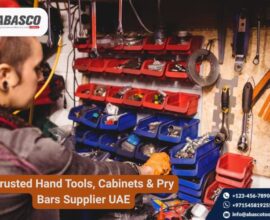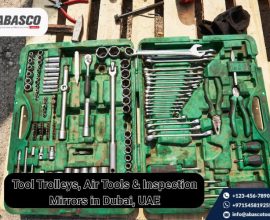Tools have been an essential part of human civilization, evolving from primitive stone implements to highly specialized, technology-driven equipment used in modern industries. The transition from traditional hand tools to advanced machinery has revolutionized various sectors, including construction, automotive, and manufacturing. Today, businesses rely on specialized suppliers like a tool bag supplier in Dubai UAE to provide durable and high-performance tools that meet industry standards. The continuous advancements in tool technology have significantly improved efficiency, safety, and precision in professional applications.
The Age of Traditional Hand Tools
Early humans crafted tools from stone, bone, and wood to aid in daily tasks such as hunting, construction, and craftsmanship. The discovery of metals like copper, bronze, and iron led to the development of stronger, more durable tools. These traditional tools were manually operated, requiring significant skill and physical effort. While they served their purpose for centuries, they lacked the efficiency and precision required for modern applications, prompting the need for technological advancements.
The Rise of Mechanized Tools
The Industrial Revolution marked a significant shift in tool design and manufacturing, introducing machine-powered tools that drastically improved productivity. The development of power drills, saws, and presses enabled workers to perform tasks with greater speed and accuracy. During this period, specialized tools such as circlip pliers became essential in mechanical work, and today, businesses can source high-quality products from a circlip plier supplier in Dubai UAE to meet industrial demands. Mechanized tools not only reduced manual labor but also enhanced precision and consistency in various fields.
The Integration of Digital and Smart Tools
With the advancement of technology, digital tools and automation have taken center stage in modern industries. Today, tools come equipped with sensors, digital displays, and automated functions to improve performance and accuracy. Devices such as portable hardness testers have revolutionized material testing by providing quick, reliable results. A trusted portable hardness tester supplier in Dubai UAE offers state-of-the-art equipment that ensures quality control in construction, automotive, and metalworking industries. These innovations allow professionals to make informed decisions with real-time data, reducing errors and improving efficiency.
The Shift Towards Ergonomic and Specialized Tools
Modern tool designs focus on ergonomics, portability, and user convenience. Manufacturers now develop lightweight, high-performance tools that reduce strain and increase productivity. The demand for specialized tools has also led to the availability of high-quality storage solutions from a tool bag supplier in Dubai UAE, ensuring professionals can carry and organize their equipment efficiently. Additionally, tools with enhanced grip, vibration reduction, and energy-efficient features have significantly improved workplace safety and efficiency.
The Role of Automation and AI in Tool Manufacturing
Automation and artificial intelligence (AI) have further transformed the tool industry, enabling predictive maintenance and smart diagnostics. Automated assembly lines, robotic arms, and AI-powered analytics now play a crucial role in tool manufacturing, ensuring consistency and precision. The incorporation of IoT (Internet of Things) in tools has also allowed professionals to monitor performance, detect faults, and optimize tool usage. These advancements help industries minimize downtime and maximize productivity.
Also Read : A Short Guide on the Definition and Uses of Hammer Wrenches
Conclusion!
As technology continues to advance, the future of tools will focus on even greater efficiency, sustainability, and digital integration. Companies like Abasco Tools Trading LLC, a leading circlip plier supplier in Dubai UAE, are at the forefront of these innovations, providing cutting-edge solutions to industries worldwide. The demand for smarter, energy-efficient, and AI-driven tools will shape the future, ensuring professionals have access to the best equipment for their needs. From traditional hand tools to sophisticated digital solutions, the evolution of tools reflects humanity’s continuous pursuit of efficiency and innovation in every field.





